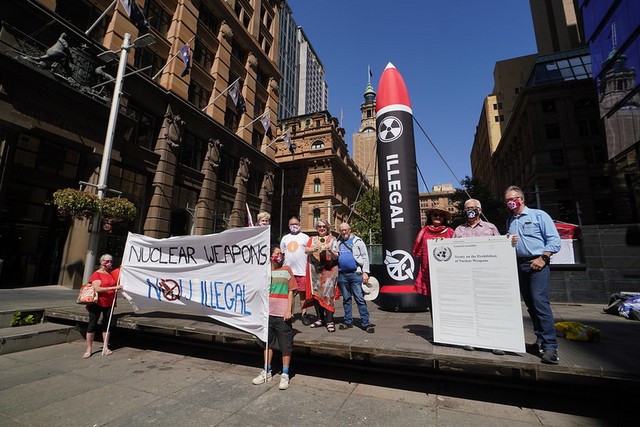By Sandy Jones
Treaty on the Prohibition of Nuclear Weapons will soon into force.
The Treaty on the Prohibition of Nuclear Weapons (TPNW) will enter into force, effective January 22, 2021. This landmark treaty prohibits nations from developing, testing, producing, manufacturing, transferring, possessing, stockpiling, using or threatening to use nuclear weapons, or allowing nuclear weapons to be stationed on their territory. It also prohibits assisting, encouraging or inducing anyone to engage in any of these activities.
The Nuclear Age Peace Foundation (NAPF), a Santa Barbara-based non-profit and partner organization with the International Campaign to Abolish Nuclear Weapons (ICAN) was involved in the initial negotiations leading up to the nuclear ban treaty at the United Nations in 2017. David Krieger, President Emeritus of NAPF commented on the treaty’s entry into force, “The entry into force of this long-awaited treaty is the culmination of more than 75 years of effort on the part of survivors of the bombings of Hiroshima and Nagasaki and many more nuclear abolitionists throughout the world. At a minimum, this treaty delegitimizes the possession, threat and use of nuclear weapons. This day marks the beginning of the end for these weapons of mass annihilation. It will be remembered in history.“
Despite their catastrophic humanitarian and environmental consequences, nuclear weapons were the only weapons of mass destruction not subject to a comprehensive ban. The TPNW closes this crucial gap in international law and now, nuclear weapons will join land mines, chemical and biological weapons as weapons of mass destruction that are declared illegal by the international community.
While the treaty is only binding on the states that ratified it, it is expected to grow in influence over time. A nation that possesses nuclear weapons may join the treaty, so long as it agrees to destroy them in accordance with a legally-binding, time-bound plan. Similarly, a nation that hosts another nation’s nuclear weapons on its territory may join, so long as it agrees to remove them by a specified deadline.
This effort to ban nuclear weapons has been led by the International Campaign to Abolish Nuclear Weapons, which is made up of more than 500 non-governmental organizations from 103 countries. NAPF has been a Partner Organization of ICAN since the campaign began in 2007. ICAN received the 2017 Nobel Peace Prize for their efforts to draw attention to the catastrophic humanitarian consequences of any use of nuclear weapons and for their ground-breaking efforts to achieve the TPNW.
Beatrice Fihn, Executive Director of ICAN, commented, “This is just the beginning … States that haven’t joined the treaty will feel its power too — we can expect companies to stop producing nuclear weapons and financial institutions to stop investing in nuclear weapon-producing companies.”
The treaty was approved by the 193-member U.N. General Assembly on July 7, 2017 by a vote of 122 in favor, the Netherlands opposed, and Singapore abstaining. Of note, among countries voting in favor was Iran. The original five nuclear powers – China, France, Russia, UK and the United States – and four other countries known to currently possess nuclear weapons — India, Pakistan, North Korea and Israel — boycotted negotiations and the vote on the treaty.
Not only did the U.S. boycott the negotiations in 2017 and refuse to sign the treaty, the Trump administration urged countries that had already ratified the treaty to withdraw their support. The treaty still has the potential to significantly impact U.S. behavior regarding nuclear weapons issues. While the new Biden administration’s most immediate task will be to get control of the Covid-19 pandemic and lessen its impact on the U.S. economy, there are many nuclear weapons issues that Biden will need to tackle, beginning with extending the New START nuclear agreement with Russia which is set to expire on February 5, 2021.
United Nations Secretary-General, António Guterres, commented, “Entry into force is a tribute to the survivors of nuclear explosions and tests, many of whom advocated for this Treaty.” He went on to describe the entry into force as “the culmination of a worldwide movement to draw attention to the catastrophic humanitarian consequences of any use of nuclear weapons. It represents a meaningful commitment towards the total elimination of nuclear weapons, which remains the highest disarmament priority of the United Nations.”
The treaty is a clear indication that the majority of the world’s countries no longer accept nuclear weapons and do not consider them legitimate. It demonstrates that the indiscriminate mass killing of civilians is unacceptable and that it is not possible to use nuclear weapons consistent with the laws of war.
ICAN will be having a compelling and inspiring online event beginning at 12:00 PM (PST) celebrating this once in a lifetime treaty. Register at [https://www.icanw.org/studio_2221]
If you would like to read the treaty in its entirety go to [http://undocs.org/A/CONF.229/2017/8]
The Nuclear Age Peace Foundation’s mission is to educate, advocate, propose and pursue denuclearizing actions with the intention of achieving a just and peaceful world, free of nuclear weapons. The Nuclear Age Peace Foundation is a non-partisan, non-profit organization with consultative status to the United Nations.
18 January 2021
Source: www.wagingpeace.org

